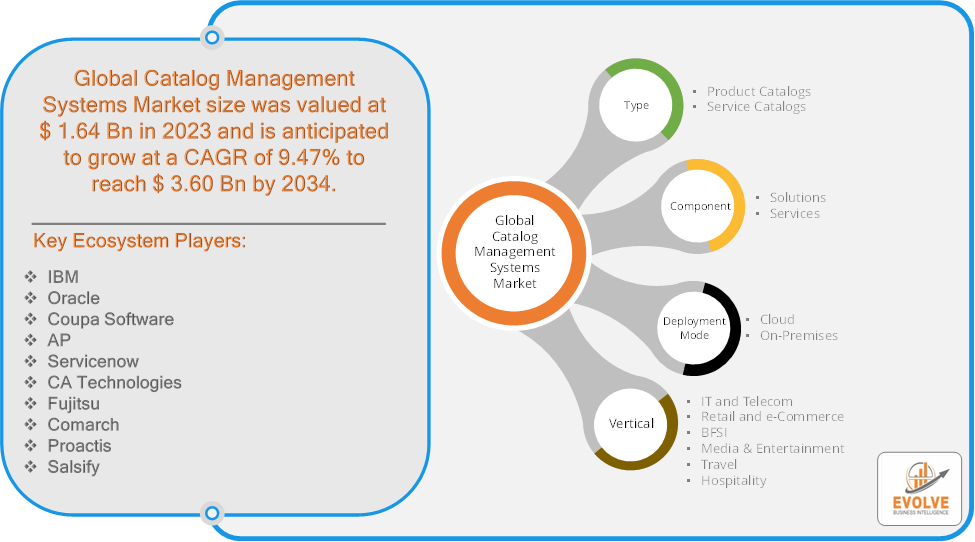Blog
Catalog Management Systems Market Grows: 9.47% CAGR

Evolve Business Intelligence has published a research report on the Global Catalog Management Systems Market, 2024–2034. The global Catalog Management Systems Market is projected to exhibit a CAGR of around 9.47% during the forecast period of 2024 to 2034.
Evolve Business Intelligence has recognized the following companies as the key players in the global Catalog Management Systems Market: IBM, Oracle, Coupa Software, AP, Servicenow, CA Technologies, Fujitsu, Comarch, Proactis and Salsify.
The Global Catalog Management Systems Market is projected to be valued at USD 3.60 Billion by 2034, recording a CAGR of around 9.47% during the forecast period. The catalog management systems market refers to the industry that provides software solutions for creating, managing, and distributing catalogs. These catalogs can be physical or digital and are used by businesses of all sizes, from small retailers to large corporations.
The catalog management systems market is expected to continue to grow in the coming years, driven by the factors mentioned above. As businesses become increasingly reliant on catalogs to reach their customers, the demand for effective catalog management tools will only increase. The Catalog Management Systems Market is crucial for businesses aiming to streamline their product management processes and enhance their market presence.
Download the full report now to discover market trends, opportunities, and strategies for success.
Segmental Analysis
The global Catalog Management Systems Market has been segmented based on Type, Component, Deployment Type, Organization Size and Vertical.
Based on Type, the Catalog Management Systems Market is segmented into Product Catalogs and Service Catalogs. The Product Catalogs segment is anticipated to dominate the market.
Based on Component, the global Catalog Management Systems Market has been divided into Solutions and Services. The Solutions segment is anticipated to dominate the market.
Based on Deployment type, the global Catalog Management Systems Market has been divided into Cloud and On-Premises. The Cloud segment is anticipated to dominate the market.
Based on Organization Size, the global Catalog Management Systems Market has been divided into Large Enterprises and SMEs. The Large Enterprises segment is anticipated to dominate the market.
Based on Vertical, the global Catalog Management Systems Market has been divided into IT and Telecom, Retail and e-Commerce, BFSI, Media & Entertainment, Travel, and Hospitality. The BFSI segment is anticipated to dominate the market.
Regional Analysis
The Catalog Management Systems Market is divided into five regions: North America, Europe, Asia-Pacific, South America, and the Middle East, & Africa. North America is expected to remain a dominant region in the catalog management systems market, driven by the presence of large enterprises and a mature e-commerce market. The region is also home to several leading players in the market, such as Adobe, Oracle, and SAP. Europe is another important region for the catalog management systems market, with a large number of multinational corporations and a growing e-commerce sector. The region is also expected to benefit from the increasing adoption of digital technologies, such as mobile commerce and augmented reality. Asia-Pacific is a rapidly growing region for the catalog management systems market, driven by the strong economic growth of countries such as China and India. The region is also home to a large number of small and medium-sized enterprises that are increasingly adopting catalog management systems to improve their operations. Latin America is a relatively small market for catalog management systems, but it is expected to experience growth in the coming years, driven by the increasing penetration of e-commerce and the growing adoption of digital technologies. The Middle East and Africa are also expected to see growth in the catalog management systems market, driven by the increasing urbanization and the development of the e-commerce sector.



